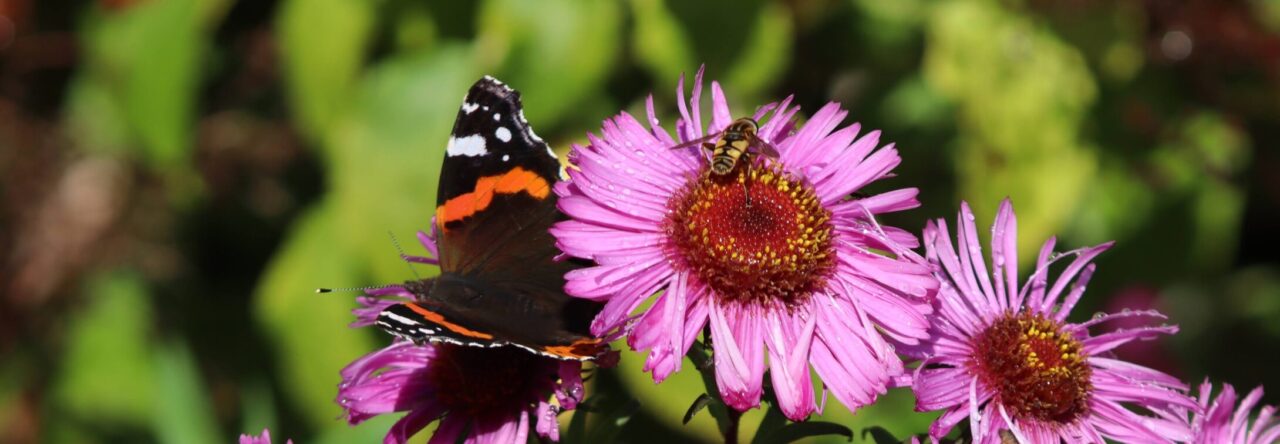Now that we are well and truly into the first semester, I thought it would be a good time to write my first blog post, and reflect on my first few weeks on the Geosciences Outreach and Engagement course. The particular themes I would like to discuss are how my ideas for my project are developing, my experience of learning about the Scottish Curriculum, and the workshop given by Dr Neil Speirs on community service learning.
Initial Ideas
My initial idea for my outreach project is that it will focus on promoting a less appealing group of animals/plants, to raise awareness of their importance, and the need for their conservation. I thought that insects would potentially be a good focus group as they lack the ‘cute factor’ and are reviled by many people, however they are experiencing serious declines. Moreover, insects are present in a range of human environments; species such as spiders, wasps, bees and ants can be seen easily without having to venture into the countryside. I want to aim my project at children aged 12-14, who have lost the ‘innate’ fascination for creepy crawlies that many young children possess, and who are starting to develop their understanding of fundamental ecological principles. I would like to engage children in the overarching theme of insects and biodiversity loss, and in so doing, foster an interest in nature among those children who may have not previously had the opportunity to connect with it. Following a meeting with my project supervisors this week, I feel encouraged that this is a viable topic. I have come away with new ideas, such as the possibility of creating a project which could be used by a museum for educational visits, and linking the theme to current events, such as COP. Now, I intend to develop my idea, and begin to consider potential resources and activities, which will align with the Scottish Curriculum.
Learning about the Scottish Curriculum
Having been educated in England, the Scottish Curriculum was very new to me! Although initially challenging, after working through the material provided to us and collaborating with my peers to design a project pertinent to the curriculum, I feel more confident about doing this for my own project. As I studied the material more deeply, I was able to see similarities with familiar parts of the English curriculum (for example, the Scottish ‘Levels‘ seem a roughly similar concept to English ‘Key Stages‘) , and this helped my understanding. To fit with the Scottish Curriculum, I am keen to implement interdisciplinary learning in my project, as it seems an impactful way of communicating concepts, and expanding peoples’ knowledge. Provisionally, the Es&Os I hope to address are SCN 3-01a, SCN 3-03a, SCN 3-05b, SCN 3-10a, SCN 3-20, and HWB 3-20a (I am keen to promote the variety of ecological careers that are available, and show how students’ knowledge and skills could be applied therein). There is also the possibility of incorporating practical/technology Es&Os, through activities such as designing and constructing insect hotels.
Community service learning – workshop reflection
Finally, the workshop on Community Service Learning opened my eyes to a different style of academic literature – though the papers Neil presented followed a similar structure to the scientific papers that I am used to reading as part of my degree, it was interesting to see a different style of writing, one more descriptive than the literature I have read on ecological and environmental sciences. As a result of Neil’s lectures, and following extra research of my own, as part of my project I am keen to establish a multidirectional flow of knowledge, and engage democratically with my client and the audience of my resources. It has been identified that schools are becoming increasingly technocratic in their teaching (Ball, 2015), focussing largely on numeric metrics such as exam results, rather than the intangible aspects of learning such as values, and civic responsibility. I hope that my project will have a positive impact on the community through such aspects of learning. For example, I hope that students will feel more comfortable engaging with nature, know the relevance of it to them, and understand the idea that the natural world is something that connects us, and that needs to be protected for future generations.
Concluding remarks
I have learnt a number of new concepts and techniques during recent weeks, some of which I had no prior experience of. The Scottish curriculum was entirely new to me but I now feel I have sufficient knowledge to be able to develop my outreach project, and increase its effectiveness in engaging young people with the natural world, and the insects to be found within it!
References:
Ball, S. J. (2015). Back to Basics: repoliticising education. FORUM, 57(1), 7-10.
